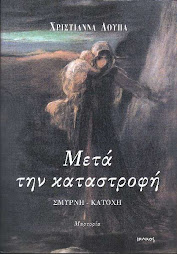
When nettles go ungrasped
Dec 11th 2008
From The Economist print edition
Wanted: a Periclean figure with enough courage to tackle the deeper causes of Greece’s mayhem
THERE is something weird and frightening about the sight of a modestly prosperous European country—assumed by most outsiders to have recovered from its rocky history of coups and civil strife—that is suddenly gripped by an urban uprising that the authorities cannot contain. Greece’s travails seem all the odder after a recent economic record which, to judge by the basic numbers alone, looks tolerably good.
Could this take place in any seemingly stable democracy, or does the land of democracy’s birth have special features? Well, the incident that sparked Greece’s mayhem—the killing by police of a teenager—could have happened almost anywhere. And there are many cities where an angry minority is ready to run amok: think of Budapest in 2006 or Paris in 2005.
But in the Greek case a spasm of rage among youngsters and the bohemian underworld has laid bare a deeper seam of discontent: with corruption, maladministration and the sheer frustration of life at the bottom of the Athenian pile (see article). There are some proximate causes, including fury over scandals (one involving a famous monastery) that seem egregious even to a nation that reveres the church and often winks at petty larceny. But far more important are problems that no Greek government has tackled. To find out what they are, ask any of the Greek-born scholars, entrepreneurs, artists and other talented types who flourish all over the world but recoil at working in their homeland, much as they love it.
As any homesick Hellene can tell you, their country can be a maddening place for people with drive and flair. The world’s universities are full of Greek academics, but the country’s own campuses are dogged by poor administration, strikes and a state monopoly on higher education. In its university system Greece hews closer to the worst aspects of the Ottoman past (such as bureaucracies that block innovation) than does Turkey, with its fine range of public and private campuses.
In health, schooling and other public services, bad state provision fuels a huge under-the-counter market—creating in turn vested interests opposed to any change. Life is tough for youngsters with energy and talent but no cash or connections. To get anywhere, they spend all day in rotten state classrooms, then trek off to private night schools where the same teachers do a slightly better job in return for money. Anybody who negotiates those hurdles must then face a dismal job market—either a dreary, dysfunctional public sector or a private sector crimped by crooked tax inspectors and crazed regulators. Of course, none of this excuses the riots. Indeed, many of the policies (such as reinforcing the ban on private education) that are advocated by self-appointed representatives of Greece’s angry young people would make their problems worse.
Serious as they are, many chronic woes have been masked, to some extent, by easy money: European Union subsidies, a boom in shipping, construction for the 2004 Olympics. With the world recession, the mask is coming off, and Greece’s politicians face a dilemma. Either they take on the vested interests that snarl things up, or the country risks forfeiting much of the economic and social progress that it has made.
Freedom depends on being courageous
To Greece’s rulers, the line of least resistance is often to do nothing, turning a blind eye to police corruption, or letting public servants pad out their salaries by taking money on the side. But the cost of letting problems fester is now even greater than the cost of curing them. Very soon one of Greece’s hard-pressed politicians—whether from the centre-right that now holds power, or the centre-left that leads in the opinion polls—will have to turn into a statesman.










Δεν υπάρχουν σχόλια:
Δημοσίευση σχολίου